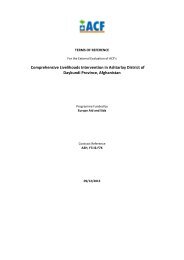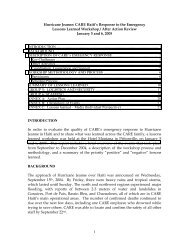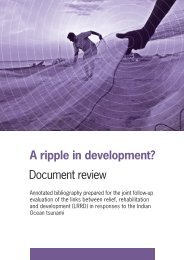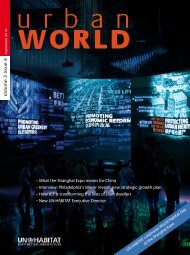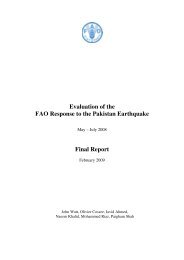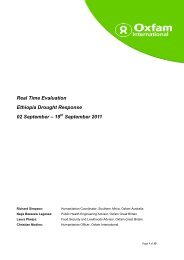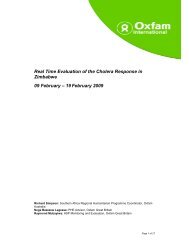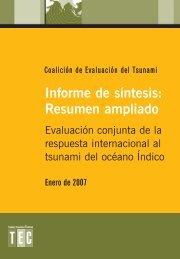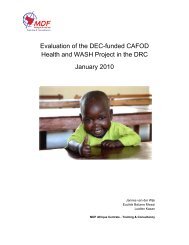Inter-Agency Real Time Evaluation of the Humanitarian ... - alnap
Inter-Agency Real Time Evaluation of the Humanitarian ... - alnap
Inter-Agency Real Time Evaluation of the Humanitarian ... - alnap
Create successful ePaper yourself
Turn your PDF publications into a flip-book with our unique Google optimized e-Paper software.
IA RTE <strong>of</strong> <strong>the</strong> humanitarian response to Pakistan’s 2010 Floods crisis<br />
g) NDMA, with OCHA, should ensure <strong>the</strong> roll‐out <strong>of</strong> <strong>the</strong> newly developed Single Reporting<br />
Format in <strong>the</strong> current and future disasters.<br />
h) NDMA, with EAD and IASC representatives, define integrated results based monitoring<br />
framework for future emergencies (aligned with single reporting format) which includes:<br />
� measurable progress indicators<br />
� outcome indicators<br />
� level <strong>of</strong> expenditures<br />
� 4 W’s (who, what, where and when)<br />
III) The Special Envoy and HC/RC with OCHA should promote humanitarian diplomacy to<br />
guarantee needs based and principled approaches during humanitarian responses and all<br />
<strong>Humanitarian</strong> actors need to commit to it. To do so:<br />
i) The HC and HCT must be in a position to prioritize and lead <strong>the</strong> humanitarian response<br />
above individual agencies interests.<br />
j) HC/RC, with OCHA, will ensure HCT alignment on guidelines for use <strong>of</strong> military assets in<br />
future emergencies (only as providers <strong>of</strong> last resort).<br />
IV) Overall funding for <strong>the</strong> current disaster has been insufficient particularly for recovery<br />
assistance and many local organisations have had difficulties in assessing funds. Therefore; in<br />
future crisis:<br />
k) HCT, in consultation with GoP and donors, should define ways to ensure that funding for<br />
existing emergency appeals is not undermined by any new emergency appeal.<br />
l) OCHA with Clusters need to build <strong>the</strong> capacity <strong>of</strong> implementing partners to ensure <strong>the</strong>y<br />
can effectively access funding, especially ERF.<br />
VI) At global level, cluster approached need to be adapted to host countries’ capacities and<br />
structures as well as to <strong>the</strong> specific scale <strong>of</strong> disaster<br />
m) IASC Working Group must ensure that guidelines on roll‐out <strong>of</strong> clusters are adapted to<br />
contextual realities (i.e. size <strong>of</strong> disaster, strength <strong>of</strong> national capacities, cross cutting<br />
issues and civil‐ and military response mechanisms and funding) and flexible to be<br />
aligned with host governments’ priorities and existing institutions.<br />
VII) There is a need to streng<strong>the</strong>n leadership <strong>of</strong> clusters. Cluster lead agencies should appoint<br />
skilled, experienced, independent/dedicated full‐time cluster leads. To mobilise qualified human<br />
resources:<br />
Riccardo Polastro, Aatika Nagrah, Nicolai Steen and Farwa Zafar<br />
60




